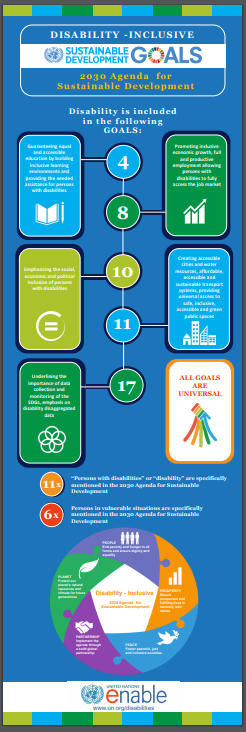Leaving No One Behind
What does it mean to empower the vulnerable?
Building on the principle of “leaving no one behind,” the UN General Assembly adopted the 2030 Agenda for Sustainable Development in September 2015, which includes 17 Sustainable Development Goals (SDGs).
Achim Steiner, Administrator of the UN Development Programme (UNDP), stated at the Global Disability Summit in London, Summer 2018, that, “To realize the promise of the 2030 Agenda – and its core pledge to leave no one behind – it is essential that all peoples, particularly those facing discrimination and exclusion, have access and voice and can participate equally in every aspect of life.”
The SDGs specifically include and reference disability and persons with disabilities. “This is a matter of justice, and equal opportunity, as well as economic growth,” Steiner continued.
The 2030 Agenda declares that “People who are vulnerable must be empowered. Those whose needs are reflected in the Agenda include all children, youth, persons with disabilities (of whom more than 80 per cent live in poverty).”
At World Hope International (WHI), we believe that empowerment includes providing access to opportunity as well as reaffirming faith in the dignity and worth of every human person.
We believe that sometimes, empowerment looks like enabling: enabling those living with disabilities to develop fine motor skills so they can sit up, stand, walk, run, hold a pencil, write, command their place in society and not be left behind.
Our Enable the Children (ETC) program in Sierra Leone is a multi-faceted project that provides home-based therapy for children living with disabilities in Freetown, promotes an understanding of disability issues within local communities and family units, and mobilizes support for people living with disability – a vulnerable group that actually consists of one billion people worldwide, or 15% of the world’s population, according to the World Bank.
The ETC program is directed by Anna Vines, a Physiotherapist from the UK who won a Point of Light Award from Prime Minister Theresa May and co-authored the Trauma Orthopaedics chapters in The Concise Guide to Physiotherapy – Volume 1: Assessment and Volume 2: Treatment by Tim Ainslie.
Every year, ETC celebrates not only the children in the program, but their families and caregivers as well, hosting a beach day outing in partnership with many other organizations and companies. This year, the event was held on February 16 and the Deputy Minister of Social Welfare, Gender, and Children’s Affairs; the President for the Sierra Leonean Union for Disability Issues; the Chairman for the Pastors Union in the east part of Freetown; the Chairman for the National Commission for Persons with Disabilities in Sierra Leone; and the President for the Union for the Blind in Sierra Leone all provided remarks that encouraged families and caregivers and emphasized seriously addressing the stigmatizing of or discriminating against people living with disabilities.
At the Global Disability Summit last summer, Deputy Secretary-General Amina J. Mohammed observed that women and girls living with disabilities suffer the “double discrimination” of sex and disability, and Henrietta Fore, Executive Director of the UN Children’s Fund (UNICEF) pointed out that children with disabilities living through conflict or disaster also face a double disadvantage as, in addition to dangers of violence, hunger, or security, they have to deal with “lack of mobility because of shattered infrastructure, difficulty fleeing harm and the prejudices that keep them from accessing the urgent assistance they need.”
The time to work alongside communities and leaders to enable children with disabilities is now.
Moving forward, ETC is hoping to build rehabilitation services for children with disabilities in Freetown and across Sierra Leone. “We would like to empower families and communities to love and accept children with disabilities, helping them to achieve their full potential,” Anna Vines shared. “We would like to see community leaders advocating for the rights of children with disabilities and seeing them as a valuable part of the society.”
If you are interested in supporting the ETC program or any of the work that WHI does to empower vulnerable populations, you can make a gift to The Hope Fund. You can also sponsor a special needs child for $55 CAD/month or contact us for more information.


